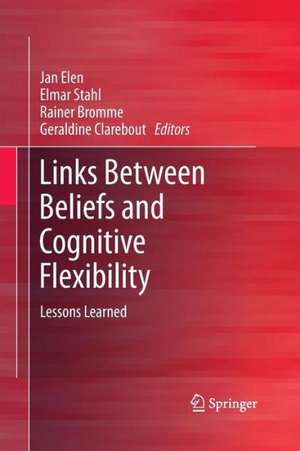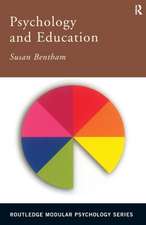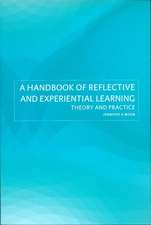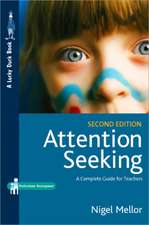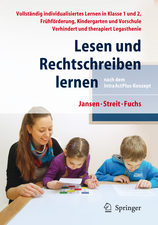Links Between Beliefs and Cognitive Flexibility: Lessons Learned
Editat de Jan Elen, Elmar Stahl, Rainer Bromme, Geraldine Clarebouten Limba Engleză Paperback – 16 oct 2014
Making adequate decisions requires considering input from a variety of continuously evolving sources rather than adhering to predetermined procedures. Adopting a position in a debate necessitates the critical evaluation of different alternatives, while solving a problem entails selecting appropriate problem-solving strategies. Meanwhile, studying requires students to integrate a range of interventions, and treating a patient involves making a differential diagnosis. The common factor, cognitive flexibility, lies at the core of effective functioning in complex, domain-specific environments.
Cognitive flexibility can be described as the disposition to consider diverse information elements while deciding on how to solve a problem or to execute a learning-related task in a variety of domains. The concept of ‘disposition’ implies that individuals will not always demonstrate cognitive flexibility even if they are in principle able to act in a cognitively flexible way. The notion does not require that alternatives are always deliberately considered, which is why this volume’s tandem discussion of beliefs is key element of the discussion. Beliefs play a central role in cognitive flexibility and relate to what individuals consider to be important, valid and/or true. Of specific interest is the relationship between epistemological beliefs and cognitive flexibility, especially as a particular subset of epistemological beliefs seems to be a prerequisite to a cognitively flexible disposition.
| Toate formatele și edițiile | Preț | Express |
|---|---|---|
| Paperback (1) | 636.80 lei 6-8 săpt. | |
| SPRINGER NETHERLANDS – 16 oct 2014 | 636.80 lei 6-8 săpt. | |
| Hardback (1) | 639.25 lei 6-8 săpt. | |
| SPRINGER NETHERLANDS – 20 aug 2011 | 639.25 lei 6-8 săpt. |
Preț: 636.80 lei
Preț vechi: 749.19 lei
-15% Nou
Puncte Express: 955
Preț estimativ în valută:
121.87€ • 124.80$ • 101.37£
121.87€ • 124.80$ • 101.37£
Carte tipărită la comandă
Livrare economică 18 martie-01 aprilie
Preluare comenzi: 021 569.72.76
Specificații
ISBN-13: 9789400796133
ISBN-10: 9400796137
Pagini: 224
Ilustrații: VIII, 213 p.
Dimensiuni: 155 x 235 x 12 mm
Greutate: 0.32 kg
Ediția:2011
Editura: SPRINGER NETHERLANDS
Colecția Springer
Locul publicării:Dordrecht, Netherlands
ISBN-10: 9400796137
Pagini: 224
Ilustrații: VIII, 213 p.
Dimensiuni: 155 x 235 x 12 mm
Greutate: 0.32 kg
Ediția:2011
Editura: SPRINGER NETHERLANDS
Colecția Springer
Locul publicării:Dordrecht, Netherlands
Public țintă
ResearchCuprins
Chapter 1 Personal Epistemology: Nomenclature, Conceptualizations, and Measurement, Jeremy Briell, Jan Elen, Lieven Verschaffel, Geraldine Clarebout.- Chapter 2 The Generative Nature of Epistemological Judgments: Focusing on Interactions Instead of Elements to Understand the Relationship between Epistemological Beliefs and Cognitive Flexibility, Elmar Stahl.- Chapter 3 Spontaneous Cognitive Flexibility and an Encompassing System of Epistemological Beliefs, Marlene Schommer-Aikins.- Chapter 4 Personal Epistemology and Philosophical Epistemology The View of a Philosopher, Richard F. Kitchener.- Chapter 5: Beliefs about Abilities and Epistemic Beliefs Aspects of Cognitive Flexibility in Information-Rich Environments, Dorothe Kienhues, Rainer Bromme.- Chapter 6 Cognitive Flexibility and Epistemic Validation in Learning from Multiple Texts, Tobias Richter.- Chapter 7 Development of Cognitive Flexibility and Epistemological Understanding in Argumentation, Beate Sodian, Petra Barchfeld.- Chapter 8 Medical Trainees’ Epistemological Beliefs and Their Cognitive Flexibility, Ann Roex, Jan Degryse, Geraldine Clarebout.- Chapter 9 Analysing and Developing Strategy Flexibility in Mathematics Education, Lieven Verschaffel, Koen Luwel, Joke Torbeyns, Wim Van Dooren.- Chapter 10 Conclusion, Geraldine Clarebout, Rainer Bromme, Elmar Stahl, Jan Elen.
Textul de pe ultima copertă
With the world and its structures becoming ever more complex, and the nature of future employment becoming ever more unpredictable, the notion of ‘cognitive flexibility’ has a high profile in educational and psychological debate. The contributions in this volume analyze the nature of cognitive flexibility, as well as the impact of different types of beliefs on cognitive flexibility.
Making adequate decisions requires considering input from a variety of continuously evolving sources rather than adhering to predetermined procedures. Adopting a position in a debate necessitates the critical evaluation of different alternatives, while solving a problem entails selecting appropriate problem-solving strategies. Meanwhile, studying requires students to integrate a range of interventions, and treating a patient involves making a differential diagnosis. The common factor, cognitive flexibility, lies at the core of effective functioning in complex, domain-specific environments.
Cognitive flexibility can be described as the disposition to consider diverse information elements while deciding on how to solve a problem or to execute a learning-related task in a variety of domains. The concept of ‘disposition’ implies that individuals will not always demonstrate cognitive flexibility even if they are in principle able to act in a cognitively flexible way. The notion does not require that alternatives are always deliberately considered, which is why this volume’s tandem discussion of beliefs is key element of the discussion. Beliefs play a central role in cognitive flexibility and relate to what individuals consider to be important, valid and/or true. Of specific interest is the relationship between epistemological beliefs and cognitive flexibility, especially as a particular subset of epistemological beliefs seems to be a prerequisite to a cognitively flexible disposition.
Making adequate decisions requires considering input from a variety of continuously evolving sources rather than adhering to predetermined procedures. Adopting a position in a debate necessitates the critical evaluation of different alternatives, while solving a problem entails selecting appropriate problem-solving strategies. Meanwhile, studying requires students to integrate a range of interventions, and treating a patient involves making a differential diagnosis. The common factor, cognitive flexibility, lies at the core of effective functioning in complex, domain-specific environments.
Cognitive flexibility can be described as the disposition to consider diverse information elements while deciding on how to solve a problem or to execute a learning-related task in a variety of domains. The concept of ‘disposition’ implies that individuals will not always demonstrate cognitive flexibility even if they are in principle able to act in a cognitively flexible way. The notion does not require that alternatives are always deliberately considered, which is why this volume’s tandem discussion of beliefs is key element of the discussion. Beliefs play a central role in cognitive flexibility and relate to what individuals consider to be important, valid and/or true. Of specific interest is the relationship between epistemological beliefs and cognitive flexibility, especially as a particular subset of epistemological beliefs seems to be a prerequisite to a cognitively flexible disposition.
Caracteristici
The links established between two related fields that nevertheless are often discussed separately Internationally renowned authors explain how cognitive flexibility is impacted by beliefs about the knowledge in specific domains The explicit orientation towards making theoretical propositions very explicit and hence open for discussion Includes supplementary material: sn.pub/extras
